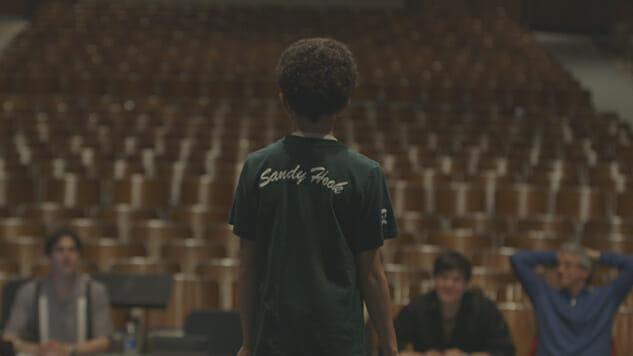Consider the agony of being a parent who loses a child, or of even being a parent on edge, not knowing if your son or daughter is coming home from school—and the candidness of those interviewed for Midsummer in Newtown is remarkable. In this enlightening documentary, three sets of Sandy Hook Elementary parents open up, sharing their thoughts and feelings on how they experienced, and are still experiencing, that fateful day in December 2012. These interviews are woven into a narrative about community theater veterans and teachers attempting to cast Newtown schoolchildren in a musical adaptation of A Midsummer Night’s Dream, demonstrating how, in the past four years, the community is trying to heal.
Director Lloyd Kramer focuses on the show’s production, places viewers among the auditions, table readings and rehearsals, from casting through opening night. To his camera, kids talk about what it’s like to be in the play, while the play’s creators describe the challenges of bringing it together. In this sense, Kramer’s film is a lively, abbreviated look at how a stage performance transforms from idea to event.
But Kramer also offers us first-person recollections, mostly by parents and teachers, of the fateful day: Where they were, what they did upon learning there was a shooter on school grounds. By alternating between these interviews and the play’s production, Kramer provides the latter with context, reminding viewers why the play ultimately matters so much. This is how they carry on from hurt, shock, disbelief and trauma—what happened on that December day is an ongoing event, one which they’ll always have to acknowledge. As one parent calmly notes, “We will never ever have normal again. But this has happened to us. What are we going to do?”
Of the parents interviewed, one pair, the Greenes, lost a child during the shooting. Their candid talk describes how the death of their daughter, Ana Marquez-Greene, affected them mentally and physically. What’s startling, yet reassuring, is that Nelba Marquez-Greene and husband Jimmy appear to have found the peace and strength to share their happy memories of Ana, talking about their belief in love and their faith that Ana is with God. At the same time, they understand that they’re not safe from someone else’s desire to inflict harm, and so are putting their efforts into mitigating that danger through compassion. Nelba is among the most compelling figures in the documentary—she’s angry, of course, at killer Adam Lanza for taking her daughter, but she also talks about her empathy for him: “I think about his lack of connection…and I think, who else could have been there for him?” Rather than become consumed by what-ifs and bitterness, Nelba founded the Ana Grace Project, which “adopts” different classrooms and encourages children to be attuned to those who may be feeling sad or alienated.
Unfortunately, there are very brief moments when Midsummer in Newtown lapses into sentimentality unworthy of its topic. Slow motion pans across picturesque New England homes, of parades with marchers waving the American flag, are intended to perhaps highlight Newtown’s fall from grace: from an idyll to one that will always be associated with a horrible massacre and whose denizens still struggle with its memory and impact. This technique, however well-intentioned, doesn’t illuminate or do justice to what we’ve been hearing from Newtown’s residents—that the community responded in complicated, multifaceted ways and will likely never be the same.
The play’s relevance amidst this complexity and confusion is best understood as one of those responses. Its director, Michael Ungar, sees the performance as a way to take peoples’ minds off the pain and channel it into cathartic art symbolic of the community—a community that, in the words of the parents, did not respond to the shootings homogenously. The event remains saddled with conflicted feelings, where comforting bromides about healing and coming together do not neatly apply. Ungar understands that nothing will make the families like the Greenes feel whole again, but he sees value in the play’s idea of love bringing the world back into balance (similarly, Nelba uses “love wins” as her post-Sandy Hook motto).
The play has value, not just as a vehicle for expression or for giving its child actors an outlet for their feelings, but as a positive gesture toward the Newtown community, a gesture of consolation that a lot of people needed. It’s because of those people willing to talk and share that Midsummer in Newtown is a testament to the power of resolve. That will to move forward is at the core of their survival, and the expression of that will is what makes Midsummer in Newtown so rewarding.
Director: Lloyd Kramer
Starring: Sophronia Gregory, Tain Gregory, Sammy Vertucci, Jimmy Greene, Nelba Marquez-Greene, Diane Vertucci, Michael Ungar, Dan Cruson, Eric Svejcar, Brian Prather, Saum Askandani, Maryrose Kristopik, Becky Virgalla
Release Date: January 27, 2017
